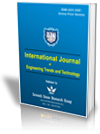Power Qualiy Problems and it’s improvement using FACTS devices
 |
International Journal of Engineering Trends and Technology (IJETT) | 
|
| © 2013 by IJETT Journal | ||
| Volume-4 Issue-5 |
||
| Year of Publication : 2013 | ||
| Authors : A.Radha Krishna , CH.Kasi Rama Krishna Reddy |
Citation
A.Radha Krishna , CH.Kasi Rama Krishna Reddy. "Power Qualiy Problems and it’s improvement using FACTS devices". International Journal of Engineering Trends and Technology (IJETT). V4(5):1462-1466 May 2013. ISSN:2231-5381. www.ijettjournal.org. published by seventh sense research group.
Abstract
Modern power systems are continuously being expanded and upgraded to cater the need of ever growing power demand. This paper explains the problems that are due to poor Power Quality in electrical systems and shows their possible financial consequences and improvement of power quality. Power Quality is characterized by parameters that express harmonic pollution, reactive power and load unbalance.. It is shown that by using the right technology a variety of Power Quality problems can be solved rendering inst allations trouble free and more efficient, and can render them compliant with even the strictest requirements. Flexible AC transmission systems or FACTS are devices which allow the flexible and dynamic control of power systems. . Finally, an introduction to the basic circuits of several FACTS controllers is provided with a focus on their system performance characteristics.
References
[1] . K. Habur, D. O’Leary “FACTS - Flexible Alternating Current Transmission Systems. For Cost Effective an d Reliable Transmission of Electrical Energy”, Siemens, 2004.
[2]. M. Gomez, O. Abarrategui, I. Zamora “FACT devices in Distributed Generation”, International Conference on Renewable Energies and Power Quality (ICREPQ’06). Palma de Mallorca (Spain), April 2006.
[3]. E. Acha “FACTS: A Modern Tool for Flexible Power Systems Interconnections”. 9th Spanish Portuguese Congress on Electrical Engineering (9CHLIE), Marbella, Spain, June 2005.
[4] K.R. Padiyar and R.K. Varma, “Damping torque analysis of static VAR s ystem controllers”, IEEE Trans.on Power Systems , vol. 6, no. 4, pp. 458 – 465, May 199 9
Keywords
Controllers, FACTS devices, Installation factors, Power quality, Power quality problems .

